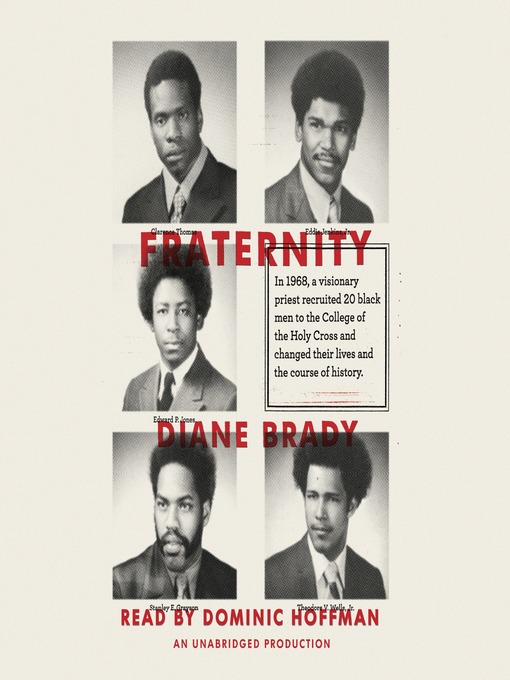
Fraternity
In 1968, a visionary priest recruited 20 black men to the College of the Holy Cross and changed their lives and the course of history.
کتاب های مرتبط
- اطلاعات
- نقد و بررسی
- دیدگاه کاربران
نقد و بررسی

After Martin Luther King, Jr.'s, assassination, Father John Brooks of Holy Cross College in Worcester, Massachusetts, recruited a number of black students, many of whom went on to distinguished careers, including Clarence Thomas. THE FRATERNITY tells their story, giving a partial social history of the time. Dominic Hoffman's slightly hoarse-sounding voice is likable, and his pacing is just right. He takes a thoughtful, sympathetic tone that brings out the feel of the text. Some misplaced emphasis on words or in sentences gives an occasional halting feel. But overall, Hoffman narrates well, striking the right note of quiet satisfaction at a heartening story in which noble actions yield exceptional results. W.M. (c) AudioFile 2012, Portland, Maine

November 7, 2011
Tucked under a title suggesting beer kegs and silliness rests a serious, readable narrative of four years in the life of the Rev. John Brooks and the cohort of extraordinary young black men he shepherded through Holy Cross College from their arrival to their 1972 graduation. Galvanized by Marin Luther King Jr.’s assassination in April 1968, “a time to heed King’s call to action and take up the mantle of civil rights,” Rev. Brooks secured authorization “to seek out black recruits and offer them full scholarships to the College of the Holy Cross.” By September, Holy Cross, in Massachusetts, had 19 black freshmen and one transfer, a remarkable achievement in an institution that “rarely admitted more than two black men in any given year.” The young men turned out to be a remarkable group as well, including, among the figures Brady attends most closely to, Edward P. Jones, author of the Pulitzer Prize-winning novel, The Known World; Theodore Wells, “widely considered to be one of the greatest trial lawyers of his generation,” having represented Scooter Libby and Michael Milken; and Supreme Court Justice Clarence Thomas, the transfer student. Although the topic may seem parochial, Brady, senior editor at BusinessWeek, has produced a cogent account that ripples more broadly and addresses issues that remain, notably affirmative action programs, but also the roles of faculty and staff, of alumni, and even parents in determining the direction of a college.

























دیدگاه کاربران